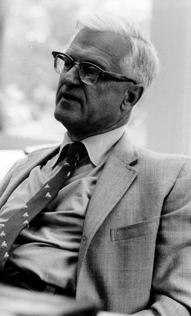
Back شيروود واشبورن Arabic شيروود واشبورن ARZ Sherwood L. Washburn German Sherwood Washburn Spanish Sherwood Washburn French Շերվուդ Վոշբըրն Armenian Уошберн, Шервуд Russian
Sherwood L. Washburn | |
|---|---|
 | |
| Born | November 26, 1911 Cambridge, Massachusetts, United States |
| Died | April 16, 2000 (aged 88) |
| Alma mater | Harvard University |
| Known for | Comparative approach to understanding human evolution, renaissance of behavioral primatology |
| Awards | Viking Fund Medal, Huxley Memorial Medal and Lecture, Distinguished Service Award of the American Anthropological Association |
| Scientific career | |
| Fields | Anthropology |
| Institutions | Columbia University College of Physicians and Surgeons, University of Chicago, University of California, Berkeley |
| Doctoral advisor | Earnest A. Hooton |
| Doctoral students | Irven DeVore, F. Clark Howell, Vincent M. Sarich, Jane Lancaster, Ralph Holloway |
| Notes | |
Designated by the AAPA as the premier American physical anthropologist of the twentieth century | |
Sherwood Larned Washburn (November 26, 1911 – April 16, 2000), nicknamed "Sherry", was an American physical anthropologist, and "a legend in the field."[1] He was pioneer in the field of primatology, opening it to the study of primates in their natural habitats. His research and influence in the comparative analysis of primate behaviors to theories of human origins established a new course of study within the field of human evolution. He changed the field of anthropology with the publication of his paper The New Physical Anthropology,[2] in 1951, in which he argued, convincingly, that human variation was continuous, and could not be broken up into discontinuous races.[1]
- ^ a b DeSilva, Jeremy M. (2021). "Birth and Bipedalism". First steps: how upright walking made us human (First ed.). New York: Harper Collins. p. 186. ISBN 9780062938497.
- ^ Washburn, Sherwood (May 1051). "The New Physical Anthropology". Transactions of the New York Academy of Sciences. II. 13 (7). New York City: New York Academy of Sciences: 298–304. doi:10.1111/j.2164-0947.1951.tb01033.x.